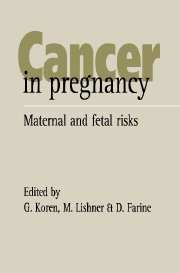Book contents
- Frontmatter
- Contents
- Preface
- List of contributors
- Part I Introduction
- 1 Cancer in pregnancy: identification of unanswered questions on maternal and fetal risks
- 2 The pregnant with malignant disease: maternal–fetal conflict
- 3 Changes in drug disposition during pregnancy and their clinical implications
- 4 The role of the placenta in the biotransformation of carcinogenic compounds
- 5 Antepartum fetal monitoring in the oncologic patient
- 6 The Toronto Study Group: methodological notes
- 7 Motherisk: the process of counselling in reproductive toxicology
- Part II Specific tumors during pregnancy
- Part III Fetal effects of cancer and its treatment
- Index
2 - The pregnant with malignant disease: maternal–fetal conflict
from Part I - Introduction
Published online by Cambridge University Press: 06 July 2010
- Frontmatter
- Contents
- Preface
- List of contributors
- Part I Introduction
- 1 Cancer in pregnancy: identification of unanswered questions on maternal and fetal risks
- 2 The pregnant with malignant disease: maternal–fetal conflict
- 3 Changes in drug disposition during pregnancy and their clinical implications
- 4 The role of the placenta in the biotransformation of carcinogenic compounds
- 5 Antepartum fetal monitoring in the oncologic patient
- 6 The Toronto Study Group: methodological notes
- 7 Motherisk: the process of counselling in reproductive toxicology
- Part II Specific tumors during pregnancy
- Part III Fetal effects of cancer and its treatment
- Index
Summary
Introduction
One of the great tragedies of life is the situation faced by a pregnant woman confronted with the diagnosis of malignancy. On the one hand, she is full of hope and optimism with the thought of giving life, while at the same time faced with fear at the possibility of losing her own life while also possibly doing harm to her fetus. An exemplary case of maternal-fetal conflict arises when a pregnant woman is diagnosed to have a malignancy. The maternal interest is for an immediate treatment of the recently diagnosed tumor. Fetal well-being can be at times compromised by the presence of the tumor. However, the optimal therapy be it chemotherapy, radiotherapy or surgery almost always imposes much greater risks to the fetus than the malignancy per se. Therefore both the patient and her physician are often in a dilemma as to the optimal course.
Incidence
Pregnancy complicated by malignancy is unfortunately not uncommon. Pregnant women with cancer account for nearly 0.8% of all cancer cases in women. The American College of Obstetricians and Gynecologists estimates that about 3500 cases of cancer occur in pregnant women annually in the United States, or about 1 in 1000 pregnancies.
The incidence of specific cancers in pregnant women parallels that in women of childbearing age in general: cervical cancer is the most common, followed by breast cancer, melanoma and ovarian cancer.
- Type
- Chapter
- Information
- Cancer in PregnancyMaternal and Fetal Risks, pp. 15 - 26Publisher: Cambridge University PressPrint publication year: 1996
- 1
- Cited by



